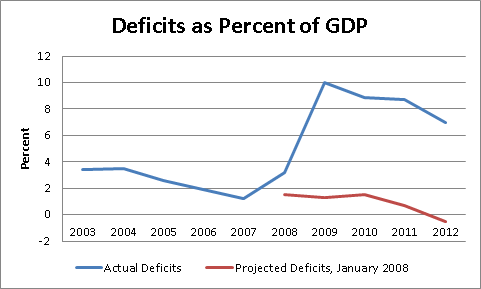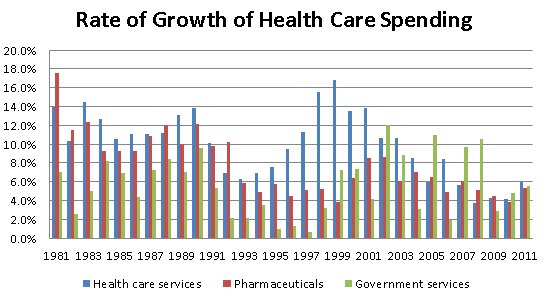November 09, 2012
That doesn’t seem likely at the moment, but there would be some real justice in this story. After all, the deficit hawks have used the deep pockets of their backers and their connections with prominent politicians and media figures to completely misrepresent the reality about the deficit.
The story of near-term deficit, as every real budget wonk knows, is the story of a collapsed economy. When the economy weakens, tax collections fall and payments for programs like unemployment insurance and food stamps rise. In addition, we also had explicit counter-cyclical policies, like the stimulus and the payroll tax cut, that were designed to boost the economy but also added to the deficit.
 Source: Congressional Budget Office.
Source: Congressional Budget Office.
As can be seen, the deficit in 2007 was a modest 1.2 percent of GDP. An amount that can be sustained literally forever. Deficits were projected to remain low, until the scheduled ending of the Bush tax cuts in 2011 pushed the budget into surplus in fiscal 2012.
The reason that we didn’t follow this path was the economic plunge that followed the collapse of the housing bubble. There were no big new permanent government programs or tax cuts pushing up the deficit in the last four years. It was the economic collapse pure and simple. The implication of this graph is that if we fix the economy we fix the deficit, end of story.
While this is fairly straightforward, our deficit hawk friends have their long-term deficit story hidden up their sleeve. This is the line that if we don’t do something about Social Security and Medicare, then we will soon have an unbearable debt burden.
This one is misleading since it really is a story about rising health care costs making Medicare, Medicaid and other public sector health care programs unaffordable. The story here should be to focus on fixing the health care system, not running around yelling about soaring deficits.
But there is potentially bad news for the deficit hawks here also. Health care costs have moderated sharply in the last few years. While this undoubtedly is partly due to the impact of the recession, the moderation has continued long enough that it is difficult to believe that we are not already on a slower health care cost growth path. Certainly costs are coming in well below thhe projections of a few years ago.

Source: Bureau of Economic Analysis.
If this is true then the deficit hawks are in a desperate race. At some point the Congressional Budget Office (CBO) will have to adjust its cost growth projections downward to correspond to a lower trend in health care cost growth.
When CBO does make this adjustment, the projections of long-term deficits will shrink by tens of trillions of dollars and the budget hawks’ horror stories will vanish. They will no longer be able to tell us how we have to be responsible by gutting our childrens’ Social Security and Medicare to save them from the burden of a crushing debt.
In this context it is easy to see the urgency around the message of the Campaign to Fix the Debt and the other organizations pushing for the overhaul of Social Security and Medicare. If they are not able to pull off their scam now, they may lose the opportunity forever. For them, that is a crisis.






